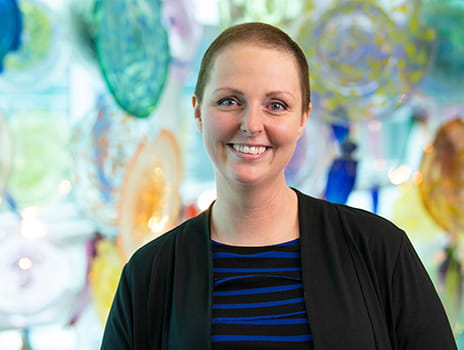- Home
- News Room
- Patient Stories Search Page
- Doctor Becomes a Breast Cancer Survivor
October 22, 2019
Jane Broxterman, MD, is an internal medicine physician at The University of Kansas Health System. About half of her patients are breast cancer survivors and women living with metastatic cancer. She has encouraged women through their darkest hours with this challenging disease.
“In theory, I was as prepared as a person could be for a breast cancer diagnosis,” admits Dr. Broxterman, 41. “But in reality, I was not prepared at all. It has been eye-opening and humbling every step of the way.”
A bump in the night
In May 2018, Dr. Broxterman collided with a closet door injuring her right breast. A few weeks later, she noticed the shape and texture of her breast tissue had changed. She alerted her primary care physician, Becky Lowry, MD.
With a clean mammogram 1 year earlier and no family history of cancer, Dr. Broxterman wasn’t worried. In fact, she took her 8-year-old daughter along. But when the technician took extra time and requested more images, she suspected something was wrong.
“The radiologist told me it was cancer until proven otherwise,” she says.
A complex breast cancer case
Dr. Lowry delivered the diagnosis to Dr. Broxterman and her husband, Larry, then immediately coordinated her care with medical oncologist Lauren Nye, MD, and breast cancer surgeon Kelsey Larson, MD, at The University of Kansas Cancer Center.
A tissue biopsy and complete examination by Dr. Nye confirmed Dr. Broxterman had triple-negative breast cancer, a rare and aggressive cancer that is challenging to treat.
Drs. Nye and Larson quickly went to work formulating a treatment plan for their colleague.
“Breast cancer is a diverse disease. The tumor size, location and images are important, but we take the time to look at many other characteristics. With the correct diagnosis, we can develop the most effective treatment plan. That sets us apart from other cancer centers,” explains Dr. Larson.
Triple-negative breast cancer was not the only concern. Dr. Broxterman also has rheumatoid arthritis, and her medications conflicted with the proposed chemotherapy regimen.
“Autoimmune diseases can increase complications during chemotherapy, surgery and radiation. Patients with complex medical histories do better at a high-volume center like ours. We have the multidisciplinary expertise to manage overlapping diseases,” says Dr. Larson.
“I’m so glad to be part of this medical community,” says Dr. Broxterman. “They know what’s right.”
In August, Dr. Broxterman began 6 cycles of chemotherapy to shrink her tumor. In January 2019, she had a single mastectomy. Soon after, she received good news. She had zero remaining cancer cells and no cancer in her lymph nodes.
“Being able to say I’m cancer-free is awesome, but cancer is a marathon. I’m trying to focus on 1 step at a time,” she says.
A slight detour
At the end of January, plastic surgeon Julie Holding, MD, placed a tissue expander to prepare the way for breast reconstruction.
“The tissue expander hurt. And every pothole we drove over made it worse. I assumed that’s the way it was supposed to be,” says Dr. Broxterman, “but then we discovered the bandages were leaking.”
Some patients’ bodies reject implants or any foreign material. Dr. Holding performed surgery the next day to remove the tissue expander and dead tissue.
“Although complications are uncommon, if they occur, we are well-equipped to deal with them and ensure the patient still has a positive outcome,” says Dr. Larson.
In a few months, Dr. Broxterman will have a prophylactic mastectomy to remove her left breast. At that time, Dr. Holding will perform a different type of breast reconstruction surgery, called DIEP flap. This procedure uses the patient’s own tissue, eliminating the risk of rejection.
Working through breast cancer treatment
While her journey with cancer is far from over, Dr. Broxterman put on her white coat and returned full-time to her medical practice on March 18.
“My purpose in life is to give. That’s my chosen profession. It has been hard to let people take care of me, and it’s time for me to return to caring for others,” she says.
On the day she returned to work full-time, she began 25 rounds of radiation therapy to reduce her risk of cancer recurrence.
Dr. Broxterman loves having a care team of 5 women. For some patients, a physician’s gender doesn’t matter. For others, it does. The University of Kansas Cancer Center has exceptional male and female physicians and surgeons.
“I have complete trust in my healthcare team. Every single one is fantastic,” she says. “I’m so glad to be part of this medical community.”
Dr. Larson appreciates the opportunity to be a part of her team. “Having one of your colleagues entrust you with their care is humbling,” she says.
Life after breast cancer
Dr. Broxterman believes her guardian angel pushed her into the closet door almost a year ago. “The injury made me pay attention to my breast and seek treatment. I hope sharing my personal story will encourage other women to be screened, and be aware of their bodies,” she says.
Her spiritual life and close-knit family have made the journey easier. Larry is a stay-at-home-dad who, according to Dr. Broxterman, “does everything.” The couple has 4 wonderful children, Adam, 14; Luke, 11; Lydia, 9; and Anna, 5. The girls fuss over their mom and the boys try to pretend nothing is wrong.
If she had to create a bracelet or T-shirt giving advice for how to deal with cancer, it would say "Be Present."
“After all," she says, "being present is a gift."
Schedule your mammogram.
We find early-stage breast cancer at a rate that exceeds the national benchmark. Schedule your mammogram online today or call 913-588-1227.
As with all treatments, individual patient results vary. It is important to discuss your treatment options with your healthcare provider.
